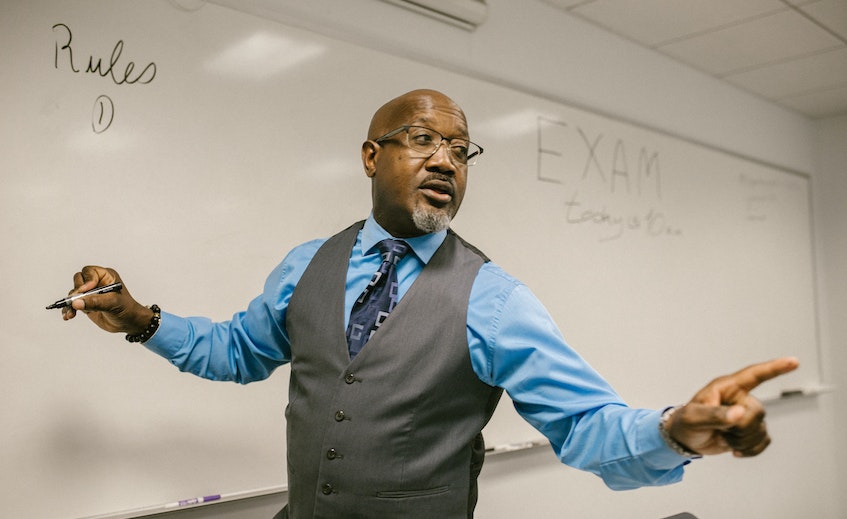
Impressions of SGM on Future of WOP 2018 in Breda
November 28, 2018
FOWOP at EAWOP
June 4, 2019In this short piece I make the observation that the field of Work and Organizational Psychology (and/or OB) is primarily white and dominated by white people.
As a white WOP-scholar myself, I ask myself three questions: why is WOP so white?, what are the effects of WOP being so white?, and what can we do to enhance diversity in WOP?
I explore the questions in a bit of detail, but this is also an open invitation to anyone to come up with suggestions, ideas, research, references, comments and so on. This may also serve as input for further discussion at the EAWOP 2019 Conference in Turin, and the Future of WOP-day preceding the conference.
There is an emerging buzz among my colleagues and friends who intend and plan to go to Turin, where end of May the EAWOP 2019 conference will take place. Quite a few friends of mine and I are honored to organize a full day around the theme ‘Future of Work and Organizational Psychology” preceding the official EAWOP 2019 conference, where we will be discussing a range of issues pertaining to the future of Work and Organizational Psychology (WOP) as a scientific discipline, embedded in the contemporary neoliberal academic system (see e.g., Bal & Dóci, 2018). For me, this will be my 7th EAWOP conference (having attended Stockholm, 2007; Santiago de Compostela, 2009; Maastricht, 2011; Münster, 2013; Oslo, 2015; and Dublin 2017). I have always enjoyed attending the EAWOP conferences, as it allowed me to travel across Europe and visit beautiful European cities, and to meet many old and new friends from across Europe, but primarily always Northern-European countries. I did not always attend EAWOP purely for the quality of the program or the keynote speakers, as there is still a lot to improve, and over time I have found many friends who shared this view, and with whom we are currently working hard to build on a future for WOP that is sustainable, critical, friendly and so on (see for instance www.futureofwop.com, and for anyone who wants to be part of this, attend our FoWOP day!). However, one of the things that has always been on my mind most prominently when attending EAWOP, is something that we need to start discussing, investigating and addressing. And this concern, as the title already suggests, is the overwhelmingly dominant white nature of Work and Organizational Psychology. The academic field WOP has been a primarily white-dominated discipline, with little or no diversity. While gender diversity is present in WOP (with many women in the field, quite a few women in elite positions, although WOP is no different from other academic disciplines in its inherent gendered structures and gender bias and discrimination), we hardly see any people of color at EAWOP conferences. This has hardly changed over the last 12 years since I started attending EAWOP conferences. It is (still) a gathering of white (and white-collar, highly educated, middle-class) people who tend to talk about the psychology of workplaces, while neglecting or undermining the more problematic features of contemporary workplaces, such as the ideological notions present in WOP research and discourse (see Bal & Dóci, 2018, and Dóci & Bal, 2018 for literature around this). My intuition is that the (dominant) ideological nature of our discipline is related to the dominant white structure of the field.
It would be a perversion of integrity and reason to suggest there is a business case for diversity: that by bringing in more people of color, WOP would also benefit from more diverse perspectives on the psychology of the workplace. Notwithstanding the potential truth of this claim, it is a perversion as it instrumentalizes the integration of people into a field. However, a much more relevant question that needs to be raised is:
“how can we claim to study the psychology of workplaces when we are largely blind to the inherent structures of our own workplace, and the resulting exclusion of these structures?”
Hence, diversity of color is not just something that would enrich our field, but should be taken as an inherent feature of contemporary society and workplaces, and hence is always important in all of our work and discourses in our institutions. Diversity is an intrinsic value, not merely as a category, which puts people into ‘diversity’ boxes that constrain thinking and individual freedom, but as a meaningful notion of how each individual has inherent dignity, and thus an entitlement to individuality, but at the same time, diversity acknowledges the historical nature of the human being, which means that we all are influenced by history, and the various (historical) groups that we are part of in society and the workplace. It is always both: I am an individual, and, I am a white highly educated, heterosexual man, and thus belonging to a group of people in Western society that has access to privileges that others don’t have. It is always important to be aware of those privileges, and to understand the implications of it, and how other people do not have such privileges. Therefore, it is everyone’s duty in WOP to address the white dominance in the field. I would like to raise a number of questions that we need to ask to make WOP (and EAWOP) more diverse.
1) Why is WOP so white?
First, we need to understand why WOP is so white, and why the field is much ‘whiter’ than other disciplines in the social sciences. There are obvious historical circumstances (e.g., academia has always been primarily white), but there are also specific reasons why work psychology has not changed much over the last 20 years. There may also be factors that may offer a ‘reciprocal’ explanation of the perseverance of whiteness in WOP: while psychology denotes the study of individuals, color has traditionally been attributed to be a social category, which may have fallen beyond the scope of psychological research (although the famous beginning of work psychology in ‘intelligence testing’ in the late 1800s was biased towards white people, and this was known as well early on). But as psychology has been dominated by the elite groups in society, notions such as structural exploitation, resistance, and systemic exclusion have been neglected in mainstream WOP research, which may have appealed less to aspiring academics of color, who may consequently have been attracted more to other disciplines such as sociology and the humanities. This may have subsequently reinforced the status quo in WOP. Yet, in my view (perhaps due to ignorance), this has not been debated in WOP, and certainly not at EAWOP conferences. And it is imperative to understand why the field is as it currently is, and how it has developed over time, to be able to contribute to a more sustainable and diverse future.
2) What effects can be attributed to the dominance of whiteness in WOP?
When the overarching majority of WOP is white, it is somewhat straightforward to pretend that this is just how it is, and that historical circumstances have caused this, and that white people are apparently more interested in and capable to do WOP research than others. A deterministic perspective on the whiteness of the field (which also not coincidentally aligns with the dominant scientific paradigm in psychology) allows for anyone to assume that this is just the natural state of affairs, or how it should be (notwithstanding the potential racist underpinnings of such notions). Negligence of ideological assumptions underlying a field of research and practice may have various deleterious effects. One such effect is the complete ignorance of the notion of ‘resistance’ in WOP. Resistance is only mentioned in relation to ‘managing change’, and as something that needs to be reduced and which is negative in nature. This is just one example of how a field that is driven by a white majority may set its own agenda in line with its world views. And there should be and will be a whole range of other effects of the whiteness of the field. We can learn and borrow from other fields to understand the impact of whiteness, but we also need to debate and research this in much more detail.
3) What can be done to stimulate greater diversity in WOP?
Finally, following a greater understanding of why #WOPSoWhite, we also need to engage in inclusive dialogue with everyone to explicitly discuss how we can make WOP more diverse, how we can build a more sustainable future for each individual, no matter what background and color, while respecting and promoting each individual’s dignity. So what can be done to make the field more inclusive and inviting to anyone who wants to join in?
These are just some questions to begin with. Obviously there is a wealth of research, knowledge and understanding beyond WOP. We need to take advantage of that to ensure a more diverse future for WOP, and to make our field such that it invites people of all backgrounds to participate and be a member of WOP, and to contribute to a field that prioritizes the scientific study of the psychology of workplaces in a way that is critical and equal, valuing pluralism in all aspects of our work, and where all people are able to contribute in ways that protect and promote their own health, well-being and dignity.
With this piece, I want to stimulate debate and action. Any input is welcome and needed: references to materials which deals with these concerns, input for discussion and debate, proposed solutions, opinions, experiences and so on and so on. As the Future of WOP movement, we strive toward promotion of equality in academia (see www.futureofwop.com), and it would be great if we could elicit some positive change in our field and academic system.
References
Bal, P.M., & Dóci, E. (2018). Neoliberal ideology in work and organizational psychology. European Journal of Work and Organizational Psychology, 27, 536-548.
Dóci, E., & Bal, P.M. (2018). Ideology in work and organizational psychology: the responsibility of the researcher. European Journal of Work and Organizational Psychology, 27, 558-560.
Matthijs Bal




